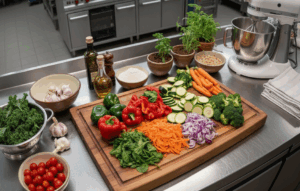Residents in nursing homes or assisted-living facilities need to eat, but that is easier said than done. Elderly patients, especially those struggling with illness, can lose interest in food. And when they lose interest, they lose weight and miss out on valuable nutrients. Both the American Medical Directors Association and Pioneer Network, a Chicago-based nonprofit group advocating culture change, recommend real food in cases where nutrients are needed.
Appetites aren’t always what we want them to be, especially for the elderly. As we age, our protein needs increase, yet our appetites, sense of smell, and taste begin to diminish. The real-food-first approach is giving patients choices they want, and if they’re having problems getting enough nutrients, trying natural foods that are high in protein and nutritionally dense.
That’s not to say that nutrition supplements have no place, but they should not be the first and only approach to try.
The solution—and part of a culture change at healthcare facilities—is to offer real food options at mealtime. This concept entails offering traditional comfort foods fortified by an extra boost of calories, proteins, and nutrients. For example, you can enhance a naturally nutrient-rich bread pudding with a yogurt-sauce topping for an extra kick of calories and nutrients.
Healthcare Food Service – What to Menu
Incorporate real food recipes that align with your regular menu and offer them to residents. For example, offer fortified creamy mashed potatoes as a side for meatloaf (or fork-tender pot roast); cream-based tomato soup with grilled cheese; macaroni and cheese with grilled or roast chicken pieces mixed in.Don’t worry about the extra fat: extra calories and nutrients are the goal here. The resident is likely not eating enough other food altogether to worry about too much fat.
Healthcare food service distributors can provide real food ideas with plenty of calories and nutrients for your menu. Here are some to think about:
Dairy Products
Serve whole milk. Puddings, yogurt, cottage cheese, ice cream, and milkshakes all which provide calories and nutrients—and are popular with residents. Egg-rich flans or custards are also excellent options. However, be sure to check lactose intolerance, which can be fairly common with the elderly.
Cereals
Fortify hot cereals with powdered milk, protein powder or extra butter.
Mashes
Turn sweet potatoes, turnips, carrots, and other nutrient-packed roots into savory, mashes, then add butter and protein. These soft mashed foods are especially appealing to those who have difficulty chewing.
Soups
Cream-based bisques and soups, made with real butter and cream
Gravies
Fat-based, stock- and/or cream-infused gravies
Casseroles
There are many creative ways to add nutrients into casseroles by using gravies, cheese, and whole-milk, cream or even bite size pieces of meat and poultry.
Desserts and candy
A small portion of a decadent dessert can provide calories that a resident would otherwise go without.
How are you adding real food to your healthcare food service menu?










